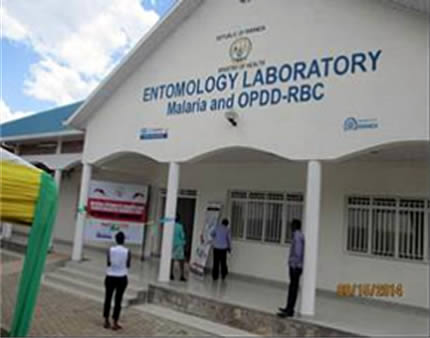Progress in malaria control requires a deep understanding and knowledge of the mosquitoes carrying the disease. The PMI-supported Africa Indoor Residual Spraying (AIRS) Project in collaboration with the Rwandan Ministry of Health’s Malaria and Other Parasitic Diseases Division (MOPDD) conducts complex entomological surveillance and research to understand vector behavior, composition, and density. PMI AIRS also tests mosquito resistance to, and the residual life of, insecticides throughout the malaria transmission period.
To help build the capacity of malaria-endemic countries to make evidence-based decisions for the implementation of malaria interventions, the PMI AIRS Project, in partnership with the MOPDD, established Rwanda’s first modern-day entomological laboratory to identify malaria-carrying mosquitoes and monitor the efficacy of vector control interventions.
The new laboratory, located in Kigali, will focus on:
- Morphological and molecular identification of malaria vectors including Polymerase Chain Reaction (PCR) for identification of sibling species of the Anopheles gambiae complex and identification of Knock-Down Resistance (KDR) mechanisms,
- Measuring insecticide susceptibility profiles and ensuring quality control for long-lasting insecticide-treated mosquito nets,
- Rearing of Anopheles gambiae s.s., susceptible strain for use in bioassays, and
- Training of medical and environmental science students in advanced entomological techniques.
Rwanda’s Director of Vector Control, Emmanuel Hakizimana, noted that the entomology laboratory would go a long way in cutting down on the cost and time for conducting specific analyses of malaria vector species. “In the past, we had to send samples to the Centers for Disease Control in Atlanta, the Kenya Medical Research Institute, and the International Centre of Insect Physiology and Ecology in Kenya, for analysis at a huge cost in terms of funds and time,” he said. “The lab will provide almost real-time data for making fast intervention decisions.” The laboratory was officially inaugurated by Rwanda’s Minister of Health and U.S. Mission Deputy Chief of Mission on September 16, 2014, and attended by 12 National Malaria Control Program Managers representing countries of the Eastern Africa Roll Back Malaria Regional Network (EARN).

